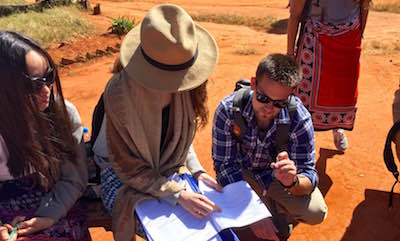In the Classroom: Avoiding ‘Barbie Savior’.

In the rural southern highlands of Tanzania, 19 students are currently studying water, sanitation, and maternal and child health in the village of Pommern.
Before they set out, the students had four orientation sessions to prepare for GH 707: Field Practicum in Public Health in East Africa, led by William MacLeod and Jennifer Beard, assistant professors of global health, and Chenzhe Cao (’16) as teaching assistant.
At the final orientation session on April 29, Professor of Global Health Davidson Hamer stopped by to discuss the students’ own health, and how to prepare. “I would worry about malaria, other mosquito-borne illness, water-borne illness, food-borne illness, spending a lot of time with Jen Beard…”
“Now you’re just trying to scare them!” Beard said.
The discussion moved on to other important preparation, covering cultural norms with Albert Magohe (an SPH student from Tanzania), the goals of the four research teams, and the itinerary—arriving in Dar es Salaam, moving to Iringa Town, and finally traveling out to Pommern.
Eventually, however, a different kind of concern emerged: how can students in the field be sure to help, rather than exploit, inconvenience, or harm?
For this orientation session, Beard assigned a recent essay by the associate dean for global health at Dartmouth, “How Not to Save the World,” on growing concerns of “voluntourism.” Cao had also recommended the satirical Instagram account “Barbie Savior,” portraying a shallow and unhelpful Western volunteer playing the “White Savior” in Sub-Saharan Africa.
Beard noted this is the first year the field program is in Tanzania—it was previously in Kenya—meaning both that this group would be making a first impression, and would also probably not see direct impact from their short time in Pommern. “What do you want to contribute with your research,” Beard asked, “to Tanzania or more broadly?”
“I really want to avoid being the Big Bad Americans coming in to fix everything and making it worse,” one student said.
“The sense of, ‘I can do better somewhere else than here [in the US]’ is so frustrating to me,” another student said, referring back to the “savior” mentality and the way Western students might overlook or undervalue local medical and public health professionals. “I’m glad we’re in a context where we’re not going to show up and draw blood when we’re not qualified.”
Instead, the class agreed the goal ought to be laying groundwork for future change, establishing partnerships with residents and local organizations and working together to document public health initiatives and challenges.
“We’re documenting information about things they may already know,” Beard said, explaining that documentation can then be used by village leaders to advocate for resources and improve the health of people in Pommern.
“The low-hanging fruit has already been picked,” Beard said. “To a certain extent, people already know what’s wrong and what’s needed.”
Rather than “trying to save the world,” Beard said being realistic and humble is what can benefit Pommern during the six weeks there. “Making your mark is probably not all that helpful.”
Toward the end of the orientation session, the group switched gears to talk about “community norms” to help the 19 students and faculty live together, as well as guidelines to keep in mind when working in Pommern or when out and about in Iringa Town (population 151,000).
In previous orientation sessions throughout April, the class had learned about Tanzania’s history and healthcare challenges, gotten a crash-course in Swahili, covered what to bring on the trip, and detailed the research work included in the course.
After this last session, the students headed for home, ready to pack their bags and continue wrestling with what it means to work in global health.
GH 707 is taking over the SPH Instagram account from June 6 through 12. Follow along at Instagram.com/BUSPH/.
Comments & Discussion
Boston University moderates comments to facilitate an informed, substantive, civil conversation. Abusive, profane, self-promotional, misleading, incoherent or off-topic comments will be rejected. Moderators are staffed during regular business hours (EST) and can only accept comments written in English. Statistics or facts must include a citation or a link to the citation.